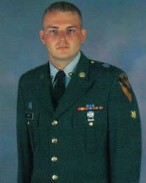National
Discharged gay troops ready to re-enlist
‘That’s the life I was destined to lead’

For Thomas Cook, deciding whether or not to re-enlist in the U.S. military after “Don’t Ask, Don’t Tell” is off the books is a no-brainer.
Cook, a Houston resident who was discharged in 2004 under the anti-gay law, said he “absolutely” plans to rejoin the armed forces on the day that the military’s gay ban is lifted.
“That’s the life I was destined to lead,” Cook said. “I think military service is in my blood and my past experience in the military — I absolutely loved it. I wouldn’t have changed anything about it. I come from a family of military people, and I’m looking forward to going back into the military as soon as I can — Sept. 20.”
Cook, now 29, said he doesn’t intend to enter the same field in the military that he held upon his discharge, nor will he enter the same branch of service. He served in military intelligence in the Army prior to his separation, but Cook said he plans to join the Air Force nursing field to make use of the education he has since received in that area.
On July 22, President Obama, Defense Secretary Leon Panetta and Chairman of the Joint Chief of Staff Adm. Mike Mullen certified that the U.S. military is ready for open service in accordance with the repeal law signed in December, starting the 60-day period for when “Don’t Ask, Don’t Tell” will be a thing of the past on Sept. 20.
Gay service members discharged under “Don’t Ask, Don’t Tell” will be able to re-enter the armed forces from that point forward. Some service members whose separations received media attention said their affinity for military service leaves no doubt in their mind that they’ll re-enter the military as soon as possible.
Cook, who first joined the Army in 2001, said he feels compelled to continue military service even though he was kicked out after he declared his sexual orientation. In 2003, the team leader in Cook’s company said during a training exercise he’d kill anyone in his crew whom he found out was gay. Cook reported the team leader’s remarks to his battalion commander and said the threat alarmed him because he is gay. The confession started Cook’s discharge proceedings, and he was ultimately separated from the Army under “Don’t Ask, Don’t Tell” on Jan. 20, 2004.
Seeking to rejoin the military, Cook was lead plaintiff in Cook v. Gates, a lawsuit challenging “Don’t Ask, Don’t Tell” that was filed by Servicemembers Legal Defense Network. However, the U.S. District Court in Massachusetts and the U.S. First Circuit Court of Appeals upheld the constitutionality of “Don’t Ask, Don’t Tell” in response to the challenge, forcing Cook to wait for legislative repeal before he could re-enter the military.
Cook said he bears no ill-will toward the military even though he was expelled from his position simply for stating his sexual orientation and was unable to reclaim his role through the litigation in which he was lead plaintiff.
“The organization itself has the policy in place, but the people I worked with didn’t necessarily believe in the policy,” Cook said. “I worked with people and the other soldiers that believe the same things I believed, which is anyone and everyone that is eligible to serve and is capable of serving should be allowed.”
Other service members whose discharges received prominent attention also said they intend to rejoin the armed forces after the gay ban is lifted — but aren’t feeling the same need to re-enlist on Sept. 20 as soon as “Don’t Ask, Don’t Tell” is off the books.
Alex Nicholson, executive director of Servicemembers United, is planning to re-enter the military as a member of the Reserves and, after obtaining a law degree, pursue a career as a military lawyer in the Judge Advocate General’s Corps.
“It’s still a lifestyle and a set of people that I am comfortable around and I’ve always had an affinity for,” Nicholson said. “It’s hard to explain the phenomenon and the fraternity that it is.”
Like Cook, Nicholson plans to take a different position than his previous role. Nicholson was an Army intelligence officer prior to his separation at the age of 20 under “Don’t Ask, Don’t Tell” in 2002. A fellow service member outed him to his unit after she read a letter he had written in Portuguese to a man he dated before he joined the Army.
After forming Servicemembers United in 2005, Nicholson became active in the discussion with the White House and Congress that led to legislative repeal of “Don’t Ask, Don’t Tell.” Nicholson was also the sole named plaintiff in the lawsuit Log Cabin Republicans v. United States, which led the U.S. Ninth Circuit Court of Appeals to institute an injunction this year barring further discharges under “Don’t Ask, Don’t Tell.”
Despite his plan to rejoin the military, Nicholson, now 30, said he plans to hold off on re-enlisting for about two or three years as he continues his advocacy work because he doesn’t believe being in the military while acting as a watchdog for gay troops is appropriate.
“I just don’t feel like I would be able to continue to do the job that I do by doing that,” Nicholson said. “That’s going to add a whole additional layer of complexity to the political work, or the watchdog work that we do, if I were to do something like that.”
Also planning to re-enlist is Mike Almy, a former Air Force communications officer who was discharged under “Don’t Ask, Don’t Tell” in 2006. He said he wants back in the armed forces because he has an affinity for it.
“It’s what I’ve done for 13 years,” Almy said. “I miss it, the people, the camaraderie, the mission and want to finish my career.”
After a fellow service member read a private e-mail revealing his sexual orientation and reported the information to his commander, Almy was discharged under “Don’t Ask, Don’t Tell.” He never made a public statement that he was gay, but was nonetheless separated.
Almy, 40, received significant attention as a service member discharged under “Don’t Ask, Don’t Tell” after testifying before the Senate Armed Services Committee last year against the military’s gay ban and taking on tough questioning from Sen. John McCain (R-Ariz.).
The best path that Almy said he sees for re-entering the armed forces is the resolution of the lawsuit in which he is lead plaintiff, Almy v. United States. The case, filed by SLDN and pending before the U.S. District Court of Northern California, seeks to reinstate him and other plaintiffs in the armed forces.
The case, Almy said, represents his best chance to return to the Air Force as an officer because of difficulties in the path ahead if he were to re-enlist at a recruiting station.
“It’s very difficult as an officer to go back on active duty, and that has absolutely nothing to do with ‘Don’t Ask, Don’t Tell,’ but just the fact that being separated and out for a couple years — coupled with the fact that there’s a drawdown — so that’s why we got the lawsuit in the works,” Almy said.
Almy added he’s expecting a resolution to the lawsuit in a couple of months and not the exact same position he held upon discharge, but a position that is comparable and the same rank.
Upon his discharge under “Don’t Ask, Don’t Tell,” Almy lost all the benefits he would have had if he had been allowed to retire on his own accord. His reinstatement in the armed forces would enable him to reclaim those benefits.
“I have none whatsoever,” Almy said. “That’s what we’re trying to get as well. Assuming we’re successful in the lawsuit and win, and get reinstatement, then we’ll pick up where we left off basically, so I’ll get those benefits, go on to finish my career and ultimately retire.”
New York
Two teens shot steps from Stonewall Inn after NYC Pride parade
One of the victims remains in critical condition

On Sunday night, following the annual NYC Pride March, two girls were shot in Sheridan Square, feet away from the historic Stonewall Inn.
According to an NYPD report, the two girls, aged 16 and 17, were shot around 10:15 p.m. as Pride festivities began to wind down. The 16-year-old was struck in the head and, according to police sources, is said to be in critical condition, while the 17-year-old was said to be in stable condition.
The Washington Blade confirmed with the NYPD the details from the police reports and learned no arrests had been made as of noon Monday.
The shooting took place in the Greenwich Village neighborhood of Manhattan, mere feet away from the most famous gay bar in the city — if not the world — the Stonewall Inn. Earlier that day, hundreds of thousands of people marched down Christopher Street to celebrate 55 years of LGBTQ people standing up for their rights.
In June 1969, after police raided the Stonewall Inn, members of the LGBTQ community pushed back, sparking what became known as the Stonewall riots. Over the course of two days, LGBTQ New Yorkers protested the discriminatory policing of queer spaces across the city and mobilized to speak out — and throw bottles if need be — at officers attempting to suppress their existence.
The following year, LGBTQ people returned to the Stonewall Inn and marched through the same streets where queer New Yorkers had been arrested, marking the first “Gay Pride March” in history and declaring that LGBTQ people were not going anywhere.
New York State Assemblywoman Deborah Glick, whose district includes Greenwich Village, took to social media to comment on the shooting.
“After decades of peaceful Pride celebrations — this year gun fire and two people shot near the Stonewall Inn is a reminder that gun violence is everywhere,” the lesbian lawmaker said on X. “Guns are a problem despite the NRA BS.”
New York
Zohran Mamdani participates in NYC Pride parade
Mayoral candidate has detailed LGBTQ rights platform

Zohran Mamdani, the candidate for mayor of New York City who pulled a surprise victory in the primary contest last week, walked in the city’s Pride parade on Sunday.
The Democratic Socialist and New York State Assembly member published photos on social media with New York Attorney General Letitia James, telling followers it was “a joy to march in NYC Pride with the people’s champ” and to “see so many friends on this gorgeous day.”
“Happy Pride NYC,” he wrote, adding a rainbow emoji.
Mamdani’s platform includes a detailed plan for LGBTQ people who “across the United States are facing an increasingly hostile political environment.”
His campaign website explains: “New York City must be a refuge for LGBTQIA+ people, but private institutions in our own city have already started capitulating to Trump’s assault on trans rights.
“Meanwhile, the cost of living crisis confronting working class people across the city hits the LGBTQIA+ community particularly hard, with higher rates of unemployment and homelessness than the rest of the city.”
“The Mamdani administration will protect LGBTQIA+ New Yorkers by expanding and protecting gender-affirming care citywide, making NYC an LGBTQIA+ sanctuary city, and creating the Office of LGBTQIA+ Affairs.”
U.S. Supreme Court
Supreme Court upholds ACA rule that makes PrEP, other preventative care free
Liberal justices joined three conservatives in majority opinion

The U.S. Supreme Court on Friday upheld a portion of the Affordable Care Act requiring private health insurers to cover the cost of preventative care including PrEP, which significantly reduces the risk of transmitting HIV.
Conservative Justice Brett Kavanaugh authored the majority opinion in the case, Kennedy v. Braidwood Management. He was joined by two conservatives, Chief Justice John Roberts and Justice Amy Coney Barrett, along with the three liberal justices, Sonia Sotomayor, Elena Kagan, and Ketanji Brown-Jackson.
The court’s decision rejected the plaintiffs’ challenge to the Affordable Care Act’s reliance on the U.S. Preventative Services Task Force to “unilaterally” determine which types of care and services must be covered by payors without cost-sharing.
An independent all-volunteer panel of nationally recognized experts in prevention and primary care, the 16 task force members are selected by the secretary of the U.S. Department of Health and Human Services to serve four-year terms.
They are responsible for evaluating the efficacy of counseling, screenings for diseases like cancer and diabetes, and preventative medicines — like Truvada for PrEP, drugs to reduce heart disease and strokes, and eye ointment for newborns to prevent infections.
Parties bringing the challenge objected especially to the mandatory coverage of PrEP, with some arguing the drugs would “encourage and facilitate homosexual behavior” against their religious beliefs.
-

 U.S. Supreme Court3 days ago
U.S. Supreme Court3 days agoSupreme Court upholds ACA rule that makes PrEP, other preventative care free
-

 U.S. Supreme Court3 days ago
U.S. Supreme Court3 days agoSupreme Court rules parents must have option to opt children out of LGBTQ-specific lessons
-

 National5 days ago
National5 days agoEvan Wolfson on the 10-year legacy of marriage equality
-

 Congress4 days ago
Congress4 days agoSenate parliamentarian orders removal of gender-affirming care ban from GOP reconciliation bill















